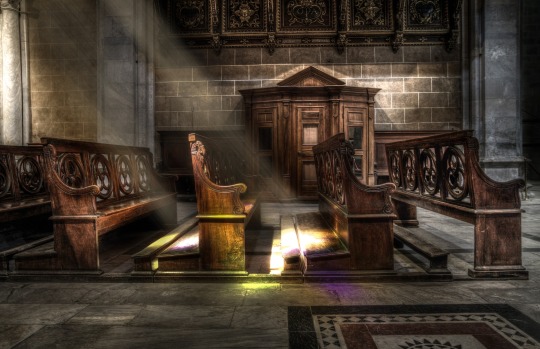#john 8
Text
Question: @/christian tumblr, what are yalls thoughts on John 8? Specifically the section that is apparently not there in the original manuscript that was added later (the story of Jesus and the woman caught in adultery)?
My personal conviction is that it doesn't matter if it was in the original or not because it perfectly makes sense for something like this to have happened even if it didn't; it's not a contradiction of anything so I have no reason to question it. In fact, it supports the narrative greatly.
That said, anyone else have any thoughts??
#i especially wanna know if#cathblr#has any thoughts on this#bible scripture#faith in jesus#faith#bible#jesus#christianity#christian#jesus christ#keep the faith#scripture#orthodox christianity#christian tumblr#christian faith#christian blog#christian bible#john 8#the woman caught in adultery#pericope adulterae#catholic#catholicism#protestant
19 notes
·
View notes
Text
Whosoever, He said, commits sin, whether Jew or Greek, rich or poor, king or beggar, is the servant of sin. O miserable bondage! ...when wearied with the hardness of his tasks... whither does the slave of sin flee? He takes it along with him, wherever he goes; for his sin is within him. The pleasure passes away, but the sin does not pass away: its delight goes, its sting remains behind. He alone can free from sin, Who came without sin, and was made a sacrifice for sin. [With these truths,] Christ purposely alarms us first, and then gives us hope. He alarms us, that we may not love sin; He gives us hope, that we may not despair of the absolution of our sin. Our hope then is this, that we shall be freed by Him who is free. He has paid the price for us, not in money, but in His own blood: If the Son therefore shall make you free, you shall be free indeed. Not from the barbarians, but from the devil; not from the captivity of the body, but from the wickedness of the soul.
[Now] the first stage of freedom is, the abstaining from sin. But that is only incipient, it is not perfect freedom: for the flesh still lusts against the spirit, so that you do not do the things that you would. Full and perfect freedom will only be, when the contest is over, and the last enemy, death, is destroyed. Do not then abuse your freedom, for the purpose of sinning freely; but use it in order not to sin at all. Your will will be free, if it be merciful: you will be free, if you become the servant of righteousness.
Saint Augustine of Hippo
#this is absolutely vital#jesus christ#True freedom is found only in God#Righteousness#saint augustine#John 8#the truth will set you free#salvation through jesus christ#Salvation#conversion#repentance#Sin#Slavery to sin#the terror of sin#do not despair#Free will#spiritual warfare#fight the good fight of faith#John 8:31#Christianity
22 notes
·
View notes
Text

2 notes
·
View notes
Text
What did Jesus write in the Sand?

I remember some years ago, wanting to be a smartass and using my madness of connection to solve this "mystery" (which may have been "solved" for hundreds of years)
For context - I'm talking about one of the more famous parts from the new testament - were the phrase "Cast the first Stone" comes from.
Basically, to not waste time, the tl;dr of it is that peeps wanna Stone a prostitute and go to Jesus to do some lawgic trap on him.
And then the famous "who is without sin" line comes from, which basically sums up the modern understanding of forgivness and redemption.
But there is another part - where Jesus starts writting something in the sand. But it dpesnt say what.
And here is the question - what was written? Simply all the sins of the elders who got humbled by that? Maybe and that would make sense.
But maybe it was something in a way less and more personal - In the Book Of Ezekiel (I think, hope I double check it) there are lines after lines comparing Israel to a whore, supposeddly being worse than the city of Sodom (famous for being destroyed by Brimstone - rocks thrown from above - see the stoning conection?)
So in a way, it was maybe using the text against the scholars, the text that they said they defend made them repent from their actions.
Because if they condemened to prostitute to death for promiscuity, without offering forgivness, what shall be the fate of Israel?
That would maybe also explain why the elders left first - they knew the texts and logic better so they realised its GG sooner, while the young ones were spiritual noobs so to speak.
But as I said, maybe this is stupid or simple and I'm just ignorant, and in that case -
Yeah...Sorry
#Also sorry for being a dick in general and casting stones#Bible#New Testament#John 8#Ezekiel 16#theology#bible study#I guess#see I can do something more random than one would guess lol#also not really a political post realised it only after ofcourse Im against Israel doing genocide and occupying land but I dont think/1#/2 a tumblr blog is the best place to agitate#3/ looks just kinda ehh to me when people draw wacky fanart while actuall people are dieing while one is collecting likes and reblogs#but if that sounds controversila to say yeah... sorry🤷♂️#Also hope nobody thinks Im calling Crona Jesus because he drew with a stick lol just a funny picture idea#if anything Crona is more of a redeemed Anti-christ figure but you gotta wait for the iceberg for that
0 notes
Text
Church notes - 15th October 2023
15th
Hebrews 13:8
Psalm 107:18
Psalm 34:8
Sermon
John 8:1 - 11
What has the Bible have to do with anything?
Everything!
Context: Jesus at the Feast of Tabernacles. (John 7)
The Jewish leaders wanted to get him.
The woman caught in adultery.
Ark of the Covenant
The mercy seat.
Jesus writing on the ground.
The finger of God.
Daniel 5
Beltshazar using the instruments from the Temple
vs 25 - 28
His days were numbered.
So was the system set up by the Jewish Leaders in the Temple.
vs 7
If any be without sin.
Desire mercy not sacrifice.
vs 9
The older ones may have been more aware of their own sins.
God is kind, but He is not soft.
He is the light of the world.
What other hope?
Challenge: Share the story of the woman with at least one other person.
1 note
·
View note
Text
John 8, Reed's Version
⟦ So everybody went home.
But Jesus went up the mountain of olive groves. The next morning he went into the temple courts, as he was accustomed. The people all flocked to him so he sat down and taught them. But then some of the religious experts and Pharisees walked up with a woman who had been caught committing adultery, and they made her stand in front of everyone. “Teacher,” they said, “this woman was caught in the act of adultery. The law of Moses says that the penalty is to be stoned to death. Do you agree?” But they only asked this in an attempt to trap him, so they could bring official charges against him. Jesus, however, just knelt down and drew in the dirt with his finger. But they stood there waiting for an answer, so Jesus finally stood up and said, “If there’s one of you who has never sinned, he may throw a stone first.” And he knelt down again to write in the dirt. At this, they all slowly walked away, beginning with the older ones, until Jesus was left there alone with the woman in front of him. So Jesus stood up and asked, “Is there no one left to accuse you?” “No one, sir,” she replied. Jesus said, “I don’t, either. Now go on your way, and don’t sin any more.”⟧
Another time Jesus was speaking to the crowds, and said, “I am the light of the world. If you follow me you’ll no longer have to walk through spiritual darkness because you’ll have my life-giving light.” But the Pharisees objected, “No witness can testify about himself! Your testimony’s not valid.” But Jesus replied, “I am testifying about myself, but it’s still valid because it’s no human testimony. I came from heaven, and I will return there. But you won’t accept this truth. You Pharisees judge superficially; I haven’t come to judge anybody. And when I do judge it’s a legitimate evaluation because it’s not only from me but also from the Father, who sent me. Doesn’t your own law state that if two people agree then their testimony is valid? I am one witness about myself, and my Father, who sent me, is the second.” But the Pharisees retorted, “Well, where is this father of yours? He must be present to testify!” Jesus answered, “You don’t know me at all, or my Father. If you knew me, you’d know who my Father was.” This conversation took place by the temple treasury, where he was teaching. But no one tried to arrest him, because it wasn’t his time.
Another time Jesus told the religious leaders, “I’m going away soon. And even though you’ll expect a pardon, you’ll die under the penalty for your sin. Where I’m going you can’t follow.” So they asked one another, “He’s not going to commit suicide, is he? Is that why he says, ‘Where I’m going you can’t follow’?” But Jesus responded, “You belong to the lower realm; I to the upper. You belong to this world; I do not. That’s why I said you will die from your sins. Unless you believe that I am who I say I am, you’ll die from your sins.” Again they mocked him, “Tell us, who do you claim to be?” Jesus replied, “I’ve told you many times already. And I have a lot to say about you, too. It’s condemning, but I must. I only speak in the world what I hear from my Master, and He doesn’t lie.” But they didn’t realize that he was referring to the Father. So Jesus told them, “Soon you’ll put me up on a cross, and on that day Israel will know that I am the Son of Man. I don’t speak on my own authority, but only as the Father has taught me to speak. Although He sent me here, He’s also here with me. He’s never left my side because He’s happy with everything I do.” And as he spoke, many people there believed in him.
So Jesus turned to address those people. “If you do not stray from my teaching then you are truly my apprentices. Then you will know truth and the truth will set you free.” But some objected, “Set us free? What do you mean? We’re descendents of Abraham! Freedom is our birthright. We’ve never been in slavery to anybody.” Jesus responded, “Everyone who sins is a slave to sin. Now, a slave isn’t part of the household; they can be dismissed at any time. But a son is always part of the family. Now if the son frees you, you are truly free! You’re technically Abraham’s descendants, and yet you’re trying to kill me! It’s because you’ve impervious to my teaching. I’m only speaking what I’ve received from the Father; you also must do what He’s told you to do.”
In reply they told him, “Our father is Abraham!” But Jesus said, “If you were Abraham’s children, you’d behave like he did. But instead, you’re trying to kill me, an innocent man! My only crime is speaking to you what I learned from God. Abraham was no murderer! No, you’re behaving like your real father.” But they objected, “Are you calling us illegitimate children!? No, God is our one father!” So Jesus told them, “If God were your Father, you would love His Son, because God is the source of my being and I came here from His side. I’m not here for my own purposes; I’m doing His work. Why don’t you understand what I’m telling you? It’s because you’re deaf to my message. You belong to your real father, the devil, and you aim to imitate his cravings. He was a murderer from the beginning, and he shuns God’s truth; there is nothing true in him. So when he speaks lies he’s speaking his native language; he is a liar and the father of lies. But I tell you the truth, and yet you won’t believe me. Can any of you show me to be guilty of sin? No? So why won’t you believe that I speak the truth? Those who belong to God will listen to His words. And that’s why you won’t listen to God; you don’t belong to Him.”
Then the Jewish leaders replied, “You’re insane and a heretic! How are we wrong?” But Jesus answered, “If I were insane, my goal wouldn’t be to honor my Father. Yet you insult Him by insulting me. Not that I care if you insult me, but God cares — and He will judge you. You can be sure of this: if you obey my teaching, in eternity you will never undergo death.” But they retorted, “Now we’re sure you’re insane! Keeping God’s teaching didn’t stop our ancestor Abraham or all the prophets from dying. How can you say, ‘Obey my teaching and you will never die’? Do you think you’re greater than Abraham? He died, and all the prophets died. Just who do you think you are?” Jesus replied, “I’m not praising myself. If I were, that praise would mean nothing. It’s my Father who praises me, the same one you claim as your God. You think you know Him, but you don’t. But I do know him. If I said I didn’t, I’d be a liar, much like yourselves! I know him and I obey His commands. Your ancestor Abraham was excited for the Messiah to come, and he was permitted to see it, to his joy.” But the Jewish leaders retorted, “You’re only a middle-aged man, and yet you say you have seen Abraham?” Jesus said, “This is true: before Abraham was born, I am.” At this, they picked up stones to hurl at him, but Jesus disappeared into the crowd and left the temple courts.
1 note
·
View note
Text





troll who isnt allowed caffeine or she'll reenact the Hammy energy drink scene from over the hedge
clay prefers tea anyway
#bruce is back home so hes not in the comic (i couldnt fit him in frame)#i stopped halfway through working on a different troll comic to make this troll comic this keeps happening#of the firm belief trolls have animalistic traits so they hashtag PLAY HARD#im talkin pouncin chasing biting etc etc#let my girls be rowdy at 8 in the morning (branch has babyproofed most of the bunker so they dont knock shit over when they run around)#trolls#trolls band together#clay trolls#john dory trolls#viva trolls#poppy trolls#branch trolls#brozone#im not tagging this as cliva cause imo they are found siblings fuck u but if u see them as lovers i support you barely#im kidding live your dream idc#my art#floyd trolls
5K notes
·
View notes
Text
The Morning Devotional: WCF 18.1 (Part One)
The Morning Devotional for May 26, 2023
The Westminster Confession of Faith 18.1 (Part One)
I. Although hypocrites and other unregenerate men may vainly deceive themselves with false hopes and carnal presumptions of being in the favour of God and estate of salvation,a which hope of theirs shall perish:b yet such as truly believe in the Lord Jesus, and love him in sincerity, endeavoring to walk…

View On WordPress
#assurance#Deuteronomy 29#devotional#hypocrites#John 8#Matthew 7#Micah 3#Westminster Confession of Faith
0 notes
Text
The Truth About You (John 8:21-30)
Our self-identification matters.
Once more Jesus said to them, “I am going away, and you will look for me, and you will die in your sin. Where I go, you cannot come.”
This made the Jews ask, “Will he kill himself? Is that why he says, ‘Where I go, you cannot come’?”
But he continued, “You are from below; I am from above. You are of this world; I am not of this world. I told you that you would die in your sins; if you do not…

View On WordPress
#acceptance#christ&039;s teaching#christian life#christianity#divine acceptance#god&039;s revelation#god&039;s acceptance#gospel of john#identity#image of god#jesus#john 8#loved by god#redemption#relationships#self image#self-acceptance#self-worth#truth
0 notes
Text
Freedom and Light - Three Prayers Inspired by John 8
Forgive by Yongsung Kim
No Condemnation by Lisa DegreniaJesus straightened up and said to her, “Woman, where are they? Has no one condemned you?” 11 She said, “No one, sir.” And Jesus said, “Neither do I condemn you. Go your way, and from now on do not sin again.” – John 8:10-11
Jesus, you do not condemYou revealYou write the truth on the sands of our souls
We hear our prejudiceWe see our…

View On WordPress
#condemnation#freedom#god&039;s light#healing#Jesus Christ#John 8#light of life#Light of the world#no condemnation#redemption#reveal#shine
0 notes
Text
[Note] Christ’s method with the sinner: To save her soul was evidently our Lord’s one thought. And He proceeded to do it in His own strange, loving way, as only He can do it. What that sin of hers was to Him, the Infinitely Pure, accustomed to the chastenesses of heaven, only the purest among us, can, in the smallest measure, see! [And yet,] mark how [that] sin affected Him. It did not alienate Him for a moment. It did not separate Him. She was never despised. She was not degraded. She was not even reproached. [Rather,] He would bring her to penitence, that He may bring her to peace. And how will He do it? By love; all love. The past is not mentioned. He raises her. He expels sin by virtue; an old feeling by a new affection. He makes Himself attractive and lovely to a heart lonely, as only sin can make us lonely. ‘Woman, where are those thine accusers? hath no man condemned thee?’ Observe in her answer a confidingness; a ray of good; an awe. She said, ‘No man. Lord.’ And then, so instant, so free, so generous, so good, so like Himself— ‘Neither do I condemn thee; go, and sin no more.’ See what Jesus would be, at that moment, to that woman! How she would love Him! How she would be always trying to please Him! How she would draw close to Him! [See, too, how] where sin is the greatest, [Christ is ever more the] gentlest! And [He will] treat everybody hopefully.
Rev. James Vaughan; Commentary on John 8:1-11
#jesus christ#the nature of god#god is love#biblical commentary#this is deeply moving#The adulterous woman#John 8#divine mercy#forgiveness#this means so much to me#do not despair#every saint has a past and every sinner has a future
3 notes
·
View notes
Text
Sunday School Live Stream - February 26, 2023
https://www.facebook.com/akronalliancefellowship/videos/916178689574153
Sunday school session with Asst. Pastor Melvin Gaines.
John 8:48-59
View On WordPress
0 notes
Text










always and forever have them on the brainnnn
also this ship really is the definition of ‘we lost the plot’ what even is malevolent anymore
#anyway no thoughts head empty only pic 8#I need to draw Marie interacting with the boys more she deserves some company#artists on tumblr#malevolent#malevolent fanart#john doe#john malevolent#oscar malevolent#marie pilon#gold cross#arthur lester and his three boyfriends#it’s the ourthur au so ofc
629 notes
·
View notes
Text
drew ya prompt again! @call-of-duty-incorrect-quotes
original post roight here
cw: SPIDERS




#Ghost: 8 legs for 8 flowers#Soap: world domination#prompt redraw#gummmyart#doodle#soapghost#ghostsoap#simon ghost riley#john soap mactavish#captain john price#kyle gaz garrick#incorrect cod quotes#call of duty
791 notes
·
View notes
Text
Church notes - 1st October 2023
1st
Colossians 3:12 - 15
John 3:1 -21
John 8:12
The Light of the World
Nicodemus
What were his motives?
Being born again - He misunderstood the concept.
Our witness
Are we blunt enough.
Do people see Jesus through us?
Ezekiel 36: 24 - 27
Numbers 21:4 - 9
The snake prefigured Jesus, in a way. The Israelites were to look to the snake in a certain way to be saved from the venom. Similarly, we are to look to Jesus to save us from our sins.
Vs 3
We need to be born again to see or experience the Kingdom.
Spiritual birth and trust.
The Kingdom of God.
Born again/Born from above.
The Light of the World.
From a spirtual point of view.
Jesus is God's ultimate gift to a dark, depraved and desparate world.
Have we missed something?
vs 16
Jesus comes as the Light of the World.
There is no greater gift.
God gave part of Himself. His Son.
He did not come to condemn, but to Save.
Nicodemus condemned himself.
It was there for the world to see.
You must be born again.
How will you choose?
#church#colossians#colossians 3#ezekiel#ezekiel 36#gospel of john#john 3#john 3:16#john 8#numbers 21
0 notes
Text
John 8:54–55
54 ἀπεκρίθη Ἰησοῦς· ἐὰν ἐγὼ δοξάσω ἐμαυτόν, ἡ δόξα μου οὐδέν ἐστιν· ἔστιν ὁ πατήρ μου ὁ δοξάζων με, ὃν ὑμεῖς λέγετε ὅτι θεὸς ἡμῶν ἐστιν, 55 καὶ οὐκ ἐγνώκατε αὐτόν, ἐγὼ δὲ οἶδα αὐτόν. κἂν εἴπω ὅτι οὐκ οἶδα αὐτόν, ἔσομαι ὅμοιος ὑμῖν ψεύστης· ἀλλʼ οἶδα αὐτὸν καὶ τὸν λόγον αὐτοῦ τηρῶ.
My translation:
54 Jesus answered, “If I glorify myself, my glory is nothing; the one glorifying me is my father, of whom you say that, “He is our God,” 55 and yet you know not him, but I know him. And if I say that I know him not, I am a liar similar to you; but I know him and I guard his word.
Notes:
8:54
The subject of the aorist passive ἀπεκρίθη (from ἀποκρίνομαι; aor. pass. form with mid. dep. sense) is Ἰησοῦς.
ἐὰν + subjunctive forms the protasis of a third-class conditional statement. Although the third-class can indicate a condition that is considered possible (whether likely or unlikely), it can also indicate a simple logical connection (Wallace 696) as it does here (since Jesus would not have considered it possible that he would glorify himself).
ἐγὼ is the emphatic subject of the aorist subjunctive δοξάσω (from δοξάζω) and ἐμαυτόν the direct object.
ἡ δόξα, modified by possessive or objective genitive μου, is the subject of the present ἐστιν (from εἰμί) and the substantival οὐδέν (“nothing”) is the predicate nominative.
ἔστιν (from εἰμί) is accented thusly at the beginning of a sentence. NIV, HCSB have ὁ πατήρ as subject of ἔστιν and ὁ δοξάζων the predicate nominative; NET has ὁ δοξάζων as subject and ὁ πατήρ as predicate. με is the direct object of δοξάζω. NASB, NRSV: “It is my Father who ...”
The antecedent of the relative pronoun ὃν is ὁ πατήρ. ὃν is an accusative of reference with the present λέγετε (from λέγω; “of whom you say”). ὑμεῖς is the emphatic subject of the verb.
ὅτι introduces direct discourse after a verb of speech. θεὸς, modified by genitive of relationship ἡμῶν, is the predicate nominative of ἐστιν (from εἰμί). Some manuscripts read ὑμῶν, in which case the discourse is indirect. The unexpressed subject of the verb (“He”) refers to ὁ πατήρ (“of whom you say, ‘He is our God’”, NASB; NIV: “whom you claim as your God”).
8:55
The direct object of the negated 2nd perfect οὐκ ἐγνώκατε (from γινώσκω) is αὐτόν, referring to God.
δὲ is adversative (“but”).
ἐγὼ is the emphatic subject of the perfect οἶδα (perf. form with pres. sense) is αὐτόν, referring to God. EGGNT says there is no distinction between γινώσκω and οἶδα in this passage (contra CGT).
κἂν is a crasis of καὶ + ἐάν. κἂν + subjunctive forms the protasis of a third-class conditional statement in which the condition is seen as possible to take place.
After a verb of speech, the 2nd aorist subjunctive εἴπω (from λέγω), ὅτι introduces direct discourse.
The direct object of the negated perfect οὐκ οἶδα (perf. form with pres. sense) is αὐτόν, referring to God.
This clause is the apodosis of the condition. ψεύστης (“liar”; see note on v. 44) is the predicate adjective of the future ἔσομαι (from εἰμί; dep. in the fut.). The adjective ὅμοιος (“like, similar to”) modifies the verb and takes a dative, here ὑμῖν.
ἀλλά indicates strong contrast.
The direct object of the perfect οἶδα (perf. form with pres. sense) is αὐτὸν, referring to God.
τὸν λόγον, modified by subjective genitive αὐτοῦ referring to God, is the direct object of the present τηρῶ (from τηρέω).
0 notes